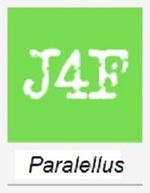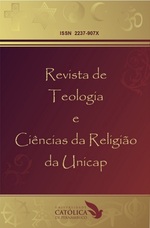THE IMPACT OF THE REAL-LIFE SITUATIONS OF LANGUAGE ON THE LEARNING OF SACRED SCRIPTURE
DOI :
https://doi.org/10.25247/paralellus.2017.v8n19.p495-502Mots-clés :
Sacred Scripture. Language.Résumé
This paper was presented in the 13th General Assembly of the Conference of Catholic Theological Institutions, hold in the Catholic University of Eastern Africa, Nairobi, Kenya, from 4 to 7 November 2014. English translation by Father Thomas Kevin Kraft, OP.
The learning of Sacred Scripture in Theology courses moves between different linguistic registers. Sometimes, those records are hardly different, other times, they become antagonistic. The first field in which these differences become perceptible is that of the differences between the language of the teacher and the languages of the students. But that's almost nothing. The greatest difference appears between the languages in which the Bible was written: Hebrew, Aramaic and Greek, and the language spoken by students and teacher. It is not only about the difference of languages that could be transposed by the use of the Bible in a translation, but to perceive that there is a universe of words from the daily life of students and absent teacher of the Bible, as well as the opposite : common words in the Bible, absent from the daily life of teacher and students. The words reflect different worlds. The student who entered the world of the Bible would perceive, in ten minutes, that in that world there is no portable. God does not communicate by portable. However, according to the Bible, he speaks. How do you speak? Talking? How to repeat what God speaks? The Bible records numerous direct discourses of God, also records cases of people who, after hearing a divine message, said nothing: one was speechless, another covered the mouth, another heard the unspeakable. In those cases, what God speaks can not be routed. The Bible moves, then, between what is said and what is unspeakable and, in a similar way, more than equivalent, between the spoken and the silence. There is still the nameless territory through which, on the other hand, the Bible passes. The food given to the people in the desert calls Manna because the Israelites asked, What is that? The nameless is also the territory of the name of the Bible, which means books. And what is the name of God? The present communication proposes to take up these linguistic registers in the process of learning the Sacred Scripture in a Theology course.
##plugins.themes.default.displayStats.downloads##
Téléchargements
Publiée
Numéro
Rubrique
Licence
A submissão de originais para a Paralellus implica a transferência, pelos autores, dos direitos de publicação eletrônica. Os direitos autorais para os artigos veiculados neste periódico são do autor; todavia, são da revista os direitos sobre a primeira publicação. Os autores somente poderão fazer uso dos mesmos resultados em outras publicações se indicarem, claramente, que a Paralellus foi o meio originalmente utilizado. Em decorrência do fato de ser a Paralellus uma revista de acesso público, é permitida a utilização gratuita dos artigos em aplicações educacionais e/ou científicas não comerciais, desde que respeitando-se a exigência de citação da fonte (Texto atualizado em 16-11-2020).


















